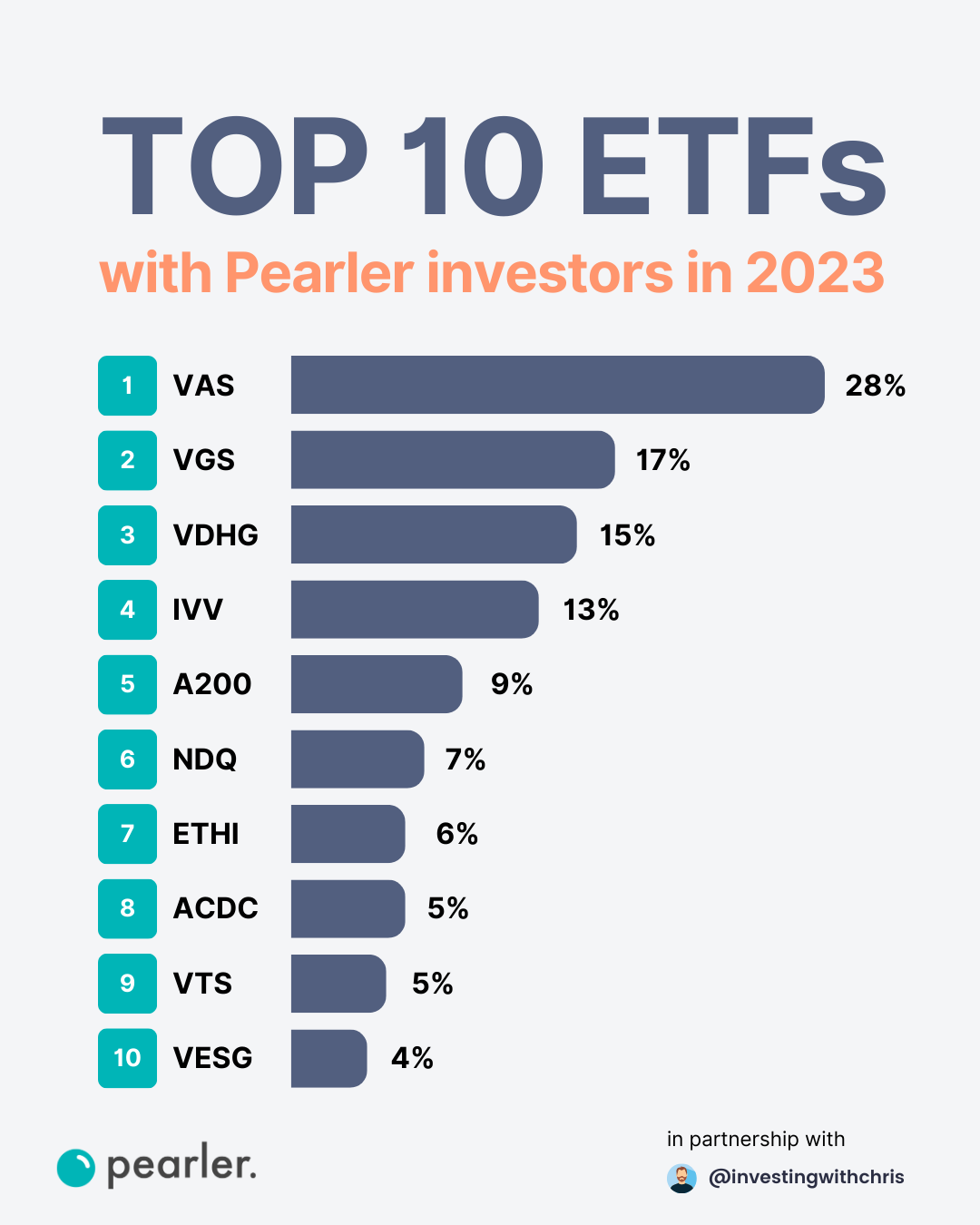Firstly, we'd like to apologise: we don't like to include more than one abbreviation in a blog article heading. However, if ever there was a subject which deserved an exception, it's ESG ETFs. Yep, for those interested, this email turned into a long one…
Over the last couple of years, ESG ETFs have been a consistent presence in the Pearler community, with two such ETFs in the top 10 holdings. However, the clear consensus on ESG, and whether they're worth it, is a ways off.
For some, it's a fiercely debatable topic (for or against), and for others it's a vague mystery. That's why, following our recent look at 2023's most popular ETFs, we've decided to explore our community's top ESG holdings.
You'll notice that the funds below reflect a broad range of indexes that have been filtered to remove certain companies or industries.
For instance, ETHI (the #1 ranking) features "large global stocks identified as 'Climate Leaders'." By contrast, FAIR (#3) invests in "Australian companies that have passed screens to exclude companies with direct or significant exposure to fossil fuels or engaged in activities deemed inconsistent with responsible investment considerations". VETH (#5), meanwhile, applies "transparent ethical screens that remove fossil fuels, nuclear power, alcohol, tobacco, gambling, weapons, adult entertainment and severe controversies."
(Side note: if you're wondering where we sourced the above quotes, they each came from the relevant ETF's factsheet. For further info on any ETF, you can always Google "[INSERT ETF NAME] factsheet".)
All of this is to say: always read beyond the label. ESG investments don't all filter out companies consistently – meaning, despite a title, there may be companies included that cause you to pause and ask: "How did that make it in there!?"
Before you invest in an ESG ETF, ensure that it aligns with your goals and values. As mentioned above, top holdings and the factsheets are a great place get your bearings.

How do they compare to Pearler's most popular ETFs?
For the second year in a row, two ESG ETFs have ranked in Pearler's 10 most popular holdings. The remaining three, meanwhile, all rank within Pearler investors' top 25 holdings.
This shows that our community has, as a whole, been consistently representing ESG within their portfolios.
For reference, here are 2023's most popular ETFs.

Let's talk about the green elephant in the room
Firstly, the G in ESG doesn't stand for Green. We maybe should have covered this above for anyone wondering, but ESG is a generally adopted tag for companies or indexes that have highly rated Ethical, Sustainable and Governance credentials.
ESG can cover a broad range of topics – from impact on the environment, to gender equality in leadership positions, to employee treatment, to number of scandals. In other words, it's not simple.
Whenever anyone brings up ESG investing, you'll normally hear a few common responses. These replies generally fall into one of two categories:
- "How do I know whether this ESG fund is as green as it claims to be?"
- "Do ESG investments underperform when compared to conventional funds?"
We don't possess the telepathy or clairvoyance to answer either of these questions definitively. Instead, we'd simply like to share a few of our thoughts on the subject.
- Greenwashing (the act of exaggerating ESG credentials) is a real concern in the investing space. Fortunately, ETFs need to meet stringent standards to earn their ESG titles. You can also research a specific ETF to know whether it aligns with your specific goals; for instance, some focus on carbon neutrality, whilst others might champion gender equality. You can learn more about greenwashing and ESG standards in this blog article.
- ESG ETFs have higher fees than the largest broad-based ETFs that don't apply any filters. For example, compare the fees of the top five ESG ETFs to the top five ETFs overall above. Fees generally have come down as ETFs have grown, so maybe if ESG grows, these fees will become more comparable. Until then, it's something to consider for yourself.
- ESG ETFs generally exclude certain sectors like oil and gas, mining, gambling, weapons, and tobacco (not surprising, but you still need to check!). As a result, in times when those industries (particularly oil and gas) have outperformed the market, ESG ETFs have missed out on those gains. Of course, history doesn't dictate the future, and short-term performance is not that important if you're a long-term investor. Even so, it isn't something we can just ignore right now.
Will ESG win out over the next 30 years? We don't know, and you should treat anyone who says the do know either way with some healthy scepticism.
Will there be a tipping point where oil and gas or mining underperforms the market? Same comment as above. Investing in ESG may be a personal issue for you, or a financial one, or both – and that's for you to decide.
Do you want to see more about Pearler's ESG ETFs? Hit the link below!


